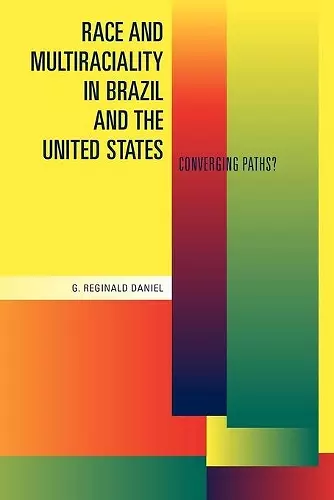Race and Multiraciality in Brazil and the United States
Converging Paths?
Format:Paperback
Publisher:Pennsylvania State University Press
Published:15th Sep '07
Currently unavailable, and unfortunately no date known when it will be back
This paperback is available in another edition too:
- Hardback£69.99(9780271028835)

Although both Brazil and the United States inherited European norms that accorded whites privileged status relative to all other racial groups, the development of their societies followed different trajectories in defining white/black relations. In Brazil pervasive miscegenation and the lack of formal legal barriers to racial equality gave the appearance of its being a “racial democracy,” with a ternary system of classifying people into whites (brancos), multiracial individuals (pardos), and blacks (pretos) supporting the idea that social inequality was primarily associated with differences in class and culture rather than race. In the United States, by contrast, a binary system distinguishing blacks from whites by reference to the “one-drop rule” of African descent produced a more rigid racial hierarchy in which both legal and informal barriers operated to create socioeconomic disadvantages for blacks.
But in recent decades, Reginald Daniel argues in this comparative study, changes have taken place in both countries that have put them on “converging paths.” Brazil’s black consciousness movement stresses the binary division between brancos and negros to heighten awareness of and mobilize opposition to the real racial discrimination that exists in Brazil, while the multiracial identity movement in the U.S. works to help develop a more fluid sense of racial dynamics that was long felt to be the achievement of Brazil’s ternary system.
Against the historical background of race relations in Brazil and the U.S. that he traces in Part I of the book, including a review of earlier challenges to their respective racial orders, Daniel focuses in Part II on analyzing the new racial project on which each country has embarked, with attention to all the political possibilities and dangers they involve.
“Daniel's book is a careful and convincingly argued exposition on race and race mixture in the USA and Brazil. Broad in scope, impressive in detail, with a bold and compelling thesis, this book brings clarity to the comparative analysis of race in the USA and Brazil and offers a richly theoretical argument about divergent trends in patterns of racialization in the two nations. At a time when scholars of race in the USA can no longer afford to ignore the nation with largest population of African descent in the Americas, G. Reginald Daniel's book will be essential reading for scholars and students alike.”
—Stephen Small, Associate Professor and Chair, African American Studies, UC, Berkeley
“Race and Multiraciality in Brazil and the United States extends our current and historical understandings of the topic beyond the United States and takes readers to a country in which multiracialism has long been an important component of national identity. Reginald Daniel’s extensive knowledge of both cases, along with his skillful comparison of the two, adds theoretical depth to the emerging debates around race and multiracialism.”
—Edward Telles, UCLA
“Whether you agree or not with the author’s prescriptions, the book brings new light to new and old problems and is a more than useful contribution to the ongoing comparison of Brazil and the USA.”
—Peter Fry Journal of Latin American Studies
“Reginald Daniel . . . has given us a systematic work on what is a most complex issue, making the volume useful for scholars in a variety of disciplines. . . . Its unusual feature is that the author approaches the topic from a sociological as well as a historical viewpoint. This interdisciplinary approach is valuable, because the subject in both countries needs a deeply historical as well as a cultural focus, a task in which the author achieves substantial success.”
—Thomas E. Skidmore Hispanic American Historical Review
“Perhaps some future focus on the voices of ordinary Brazilians of varying degrees of African ancestry could be a logical progression in Daniel’s valuable contributions to the study of comparative racial dynamics.”
—Stanley R. Bailey Contemporary Sociology
“Daniel’s book is a significant contribution to the study of comparative race relations and will force scholars of Brazilian and American history to investigate more thoroughly the complex interaction of color, racial identity, and political activism.”
—Ollie Johnson Journal of American Ethnic History
ISBN: 9780271032887
Dimensions: 229mm x 152mm x 22mm
Weight: 626g
384 pages